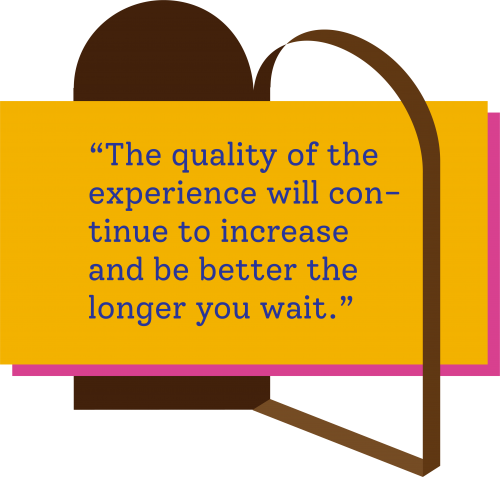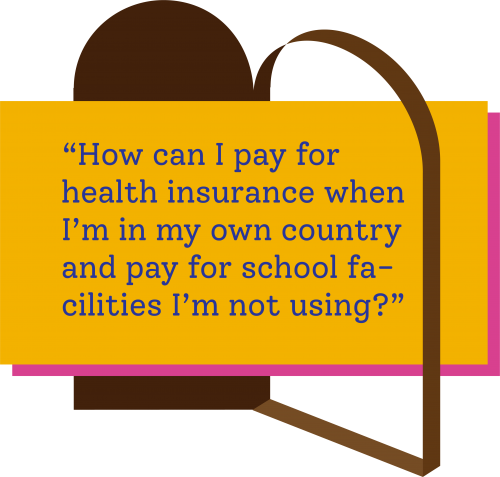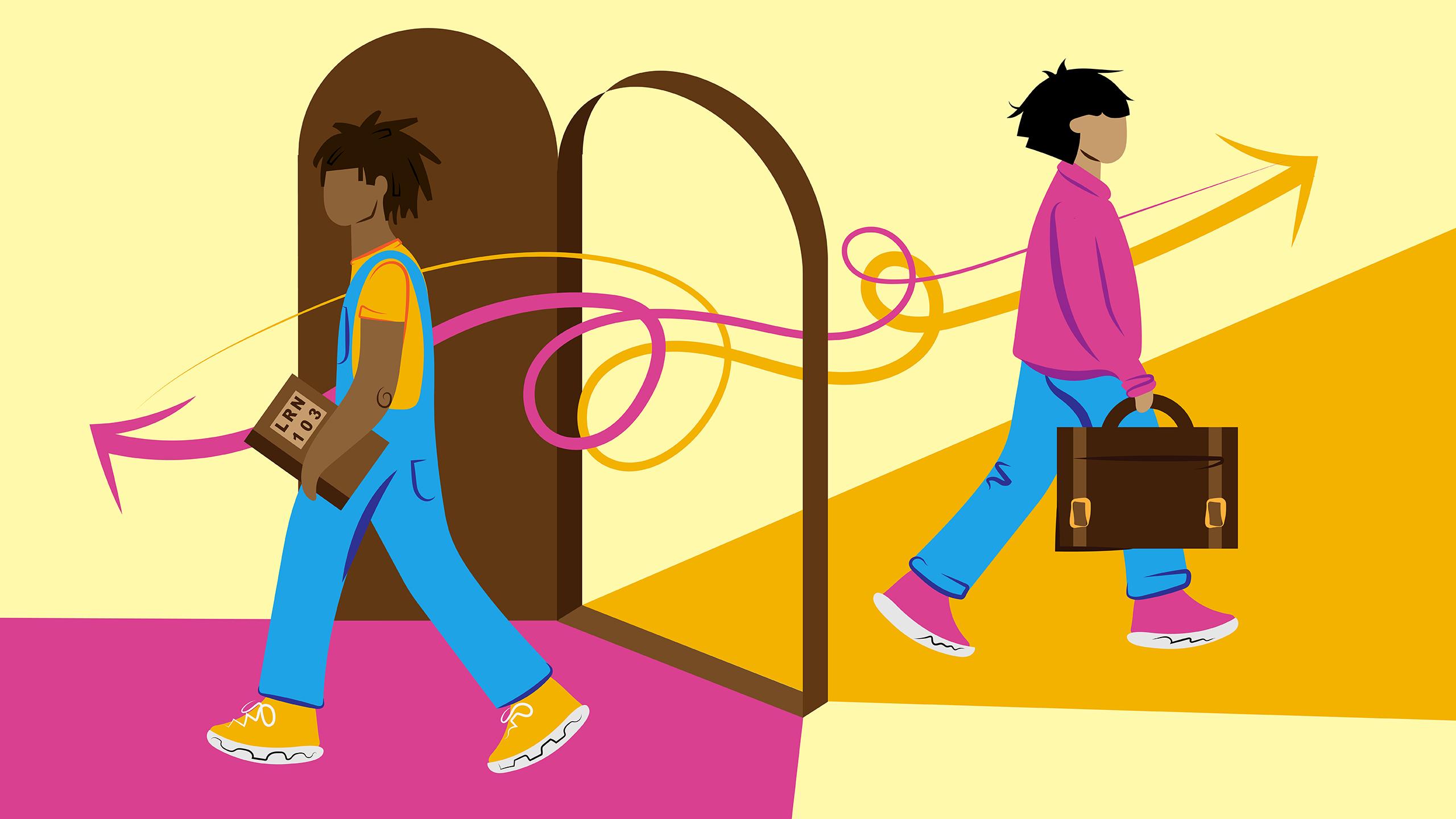Waiting things out might actually open more doors for students deferring due to the pandemic.
By Jemma Dooreleyers and Dhriti Gupta
Illustrations by Jes Mason
Pre-pandemic, a regular school day for Farhan Ahmed* started at six in the morning so he could leave the house an hour and a half before his first 8 a.m. class. While his peers who took the GO train could fit in a quick reading on the train, Ahmed wasn’t usually able to concentrate on anything between the subway transfers and bustling crowds that disrupted his commute. He rushed from Dundas Station to campus to attend one of his seven classes. He had class every few hours, and afterwards he retreated to the seventh floor of the Student Learning Centre (SLC) to study for quizzes, lab reports and weekly midterms until it’s a couple hours past dark. Only then, around 9 pm when he’s fully exhausted, would he go home and get ready to do it all again the next morning.
As a chemical engineering student at Ryerson, this has been his life for five days a week, 16 hours a day, for the past three years. Despite the bone-deep daily exhaustion and the lack of time to do anything other than study, Ahmed never felt anxious on the first day of school for what was to come.
This is because he had one thing to ground him: he knew what he was getting himself into.
But the first week of school this year couldn’t be further from that. As a fourth-year student, most of Ahmed’s courses rely on lab-based learning. In fact, a fourth-year chemical engineering course on unit operations is an entirely lab-based class without lectures. And without the expensive equipment to conduct labs at home, instructors would provide pre-made data sets for the students to analyze for their practical courses, says Ahmed. This means that this semester, students won’t necessarily conduct these experiments in person—something that Ahmed feels would hinder his learning experience.
“In the long run it will affect me,” he says. “The people that graduated before me, they actually did the experiments, but we won’t get to do that this semester.”
While he understands that most companies train their employees for the tasks they’ll be doing, he feels he would be missing some of the more practical knowledge that is gained during hands-on lab experiences at school.
Not only would Ahmed be missing out on important information, he might actually have more difficulty holding on to the information that he would be learning, suggests a study published in the Journal of Computing Sciences.
David Heise, a liberal arts professor at Columbia College, teaches an introductory course on computer and circuit board construction using a combination of simulated and physical labs. After observing the class’s learning patterns, he found that the physical labs produced better test results and knowledge retention in students. He noticed that students would often submit incomplete labs if they were computer-simulated and spent much more time and effort on in-person labs. He says that students who complete the physical lab tended to experience a feeling of satisfaction and an increased interest level.
In fact, Ahmed’s favourite undergraduate experience so far was a co-op term he did at a polyurethane manufacturing company in his third year. While doing research and development for them, he found himself working on new projects, always excited to see the end result.

So, instead of going to school this semester, Ahmed has secured a 12-month work term at a company that makes pharmaceutical vaccines. He’ll be falling behind on his degree, but he says it’s worth it to get the hands-on experience, pay and connections that you can’t get by sitting at home and watching lectures.
Steve Joordens, a psychology professor at the University of Toronto Scarborough and an expert in educational technology and online learning, can understand why students may be wary to go back to school this semester.
He says that human brains tend to seek the comfort of situations where they can feel ready, prepared and in control.
“There’s something anxiety inducing about the unknown,” he says. “Your brain is continually trying to predict what will come next.” Joordens explains how this is like opening a door. In your house, your mind already knows what it expects to see when you open the door to your bedroom, and when you get what you expect, it arms you with a sort of comfort.
When that predictive knowledge is missing, our anxiety system kicks in. We begin to fear doing the wrong thing because we don’t know what counts as “right” anymore. It becomes that much easier to spiral about things like bad grades. According to Joordens, due to the feeling of threat, “there is literally less blood flowing to our frontal lobes,” the part of our brains responsible for important cognitive skills such as emotional expression, problem solving, memory, language and judgement.
When we are in this more primitive, survival-mode of thinking, Joordens says it might be harder to learn.
Ahmed found himself in this very situation in the two classes that he took over the summer. While he passed and got the credits he needed for the classes, it only made him more confident in his decision to defer.
“It’s easier to absorb information while you’re [physically] in class,” he says. “You can’t just look away or use your phone or something like that.”
Students like Ahmed across Canadian universities are deferring to compensate for the loss of more practical experiences or opportunities that would add another layer of difficulty to engage with online school.
For these students, Joordens says waiting it out might actually result in a higher quality education when they do decide to go back to school.
“We’re at a point right now where faculty are just figuring out what online learning is—for maybe 90% of them, they’ve never taught online before.”
He says that last school year, near the end of winter semester, the main goal for professors was just to get their lectures and tests online for students to complete. But now, the longer they spend in the online world, the more opportunity there is for faculties to form better teaching strategies. This process takes time however, and Joordens notes that the quality of the experience in a course this fall will largely depend on how well each faculty member has been able to upskill to the online world.
“If you could wait a term or two, if it’s perfectly fine for you to do so,” he says. “The quality of the experience will continue to increase and be better the longer you wait.”

hen Juliet Mafua first got her acceptance letter to the public relations graduate certificate program at Humber College in February, she immediately started making travel plans to make the shift from her home in Lagos, Nigeria to Etobicoke, Ont.
As an international journalist for the BBC and a correspondent for the entire continent of Africa, Mafua practically lived at the airport, jumping from country to country. For the past 10 years she lived a life of waking up early for morning shows and pitch meetings, boarding planes to chase sources and working until 1 a.m. to file stories.
In the last year or so however, she realized that she had not only lost her once-bright passion for news, but also any time for her family, friends or herself. She realized she wanted a change—and a big one—so she filed a year-long study leave from the BBC and set her sights on Toronto and the realm of corporate communications.
Mafua envisioned a different life for herself, starting fresh in a new place. “Learning isn’t the only reason a lot of us are coming to study outside our home country. I particularly am interested in learning a new culture.” She wanted to travel, thrive in a multicultural environment, interact with new people, make connections and then bring all the stories of those experiences back to her home country. “These skills are not simply acquired in class.”
In February, Ernst and Young (EY), a consulting firm, synthesized surveys from 40,000 prospective international students for the 2020-2021 school year. It found that 37 per cent of international students were considering deferral due to pandemic related causes. In April, those students were surveyed again and EY found that the number of international students planning on deferring had jumped to 65 per cent, with another 30 per cent saying that they were planning on changing their course of action in some way.
According to the Canadian Government’s immigration website the study permit application process has been delayed due to the pandemic. In order to get a port of entry letter and permission to enter the country as a student by Sept. 2020, the application must’ve been approved on or before March 18, 2020.
Delays in study permit confirmation aren’t the only hurdles for international students—they’re also a vulnerable population. They’re being overlooked by the Canadian government, and are suffering mentally because of it, according to an essay published in International Social Work in July 2020.
The author of the piece, Trent University social work professor David Firang, says this is due to a number of reasons, with the first one being their non-permanent resident immigration status. International students aren’t eligible for the financial assistance that the government enacted earlier in the pandemic.
Without financial assistance such as the Canada Emergency Response Benefit (CERB) and the Canada Emergency Student Benefit (CESB), many international students reported mental distress. Loneliness is another reason international students are vulnerable. With the shutdown of campuses and the closure of borders, students studying abroad are faced with feelings of isolation and anxiety.
So, when Mafua learned Humber would be shifting their classes online, she had to make the difficult decision to defer her acceptance to January 2021. She recalls being filled with sadness as she selected coronavirus as the reason for her deferral request on the online form—this wasn’t in her plans at all. Like many, she initially thought the pandemic would work itself out before long. After the travel restrictions were implemented in Canada, she knew it wouldn’t.
For her, going through the deferral process is the only reasonable option.
Without the important hands-on opportunities she was looking forward to, taking online classes from Lagos would be unsustainable for her. If she were in Canada, she would be on study leave and working a part-time job along with her classes. But since she’s no longer going, she has to keep her job at BBC. “I’m still working full-time across my whole country—my classes would suffer. I can’t combine the two.” Not to mention, she would still be paying the full international price of tuition—$17,027.
“That’s what’s hurting. We are paying basically everything,” she says. “How can I pay for health insurance when I’m in my own country and pay for school facilities I’m not using?”
Mafua says there’s been clamour amongst the international student community to reduce fees, but nothing is being done to compensate for all that they’re missing out on. “That’s why you’re paying all that money, not to sit in front of a laptop.”
In the spring, Ryerson said that tuition would not be lowered for online learning and that fees would remain the same. In a statement from Ryerson’s president Mohamed Lachemi, this is because “Ryerson must always put long-term economic health as a priority. ”
While she’s hoping that travel restrictions lift in time for the winter semester, Mafua is doing her best to stay positive. This isn’t something that’s been easy for her. When she was first looking to defer, she came across a group of international students from Humber on Facebook, many of whom were in the same boat. Via a friend from this group, Mafua was added to a WhatsApp group chat of more than 100 international students from Humber and beyond. There, students bond over visa rejection letters and share their predictions about travel restrictions. Mafua says the support from her peers has been a huge help to her outlook on her deferral.
“It’s a really helpful community,” she says. “I’m happy I found this group, it’s kept me going during this time.”
Joordens says support systems like these are needed in times of anxiety or emotional stress.
“Anytime we have mental health challenges, our go-to response as human beings is our close social network,” he says. “Technology certainly doesn’t have to get in the way of peer interactions and a feeling of being connected to your peers.”
When it comes to her day-to-day life during the pandemic, Mafua has also experienced some upsides. Since she’s staying on at her full-time job, she’s able to save more than she anticipated. Her stay has also allowed her to explore human interest journalism and take things a little bit slower for the first time in 10 years—no more 4 am mornings. She says these past few months have reminded her that even though she’s ready for the next phase of her life, she’ll always carry that little journalistic spark in her heart.

hile COVID has left some people searching for more hands-on opportunities, not everyone is looking to defer because of the pandemic—some are looking to enroll.
In fact, according to admission numbers revealed at Ryerson’s Board of Governors (BoG) meeting in June, the university saw a 4.3 per cent increase in first-year students who have confirmed their acceptance offers and paid the tuition deposit fee compared to last year.
For Costanza Cavaliere, an education assistant with the Dufferin-Peel region who works in a classroom with students with autism, her decision to go back to school was made easier by classes going online for the fall semester.
Three years ago, Cavaliere attended the Ryerson undergraduate general open house to look for answers. First she spoke with admissions. They told her that there were no exceptions, she had to attend full-time. Determined to cover all of her bases, she made her way to the Child and Youth Care booth where she was told the same thing. No night classes, they told her. Nothing was offered for online learning, and there were no part-time options for mature students with full-time jobs. She left the open house feeling frustrated.

She knew that in order to do the work she wanted to with her students, such as design their learning and behavioural strategies and attend meetings where she could advocate for their best care, she needed the qualifications to show the school board that she was qualified to make these decisions.
According to a study published in Research in Social Stratification and Mobility in 2011, employers often discriminate based on credentials and formal education achievement when deciding who to hire for certain positions. According to the study, employers favoured candidates who had super-elite schooling as well as extra-curricular opportunities and experience working in their given field.
But between her daily commute from Toronto to Mississauga, looking after her dog and having to constantly be on her “A game” in the classroom, she wasn’t sure how it would be possible to get her diploma. On top of all of that, she had never applied to the Ontario Student Assistance Program (OSAP) and didn’t want to start accumulating debt now.
“I need to continue working and I’m not quitting my job,” she said. “I am in my mid-30’s and I have bills to pay.”
“Living day to day was more of my concern than going back to school and not having any income.”
So when Humber announced the shift to online classes, she entertained the opportunity after some thought. Finally, she would be getting the diploma she needed in order to feel fulfilled in her job without having to lose it first. However, after getting accepted to the program a week after she applied, she still felt as though she needed time to consider the admission. Speaking with friends, family and colleagues about her decision, she weighed the pros and cons.
“I felt unsure,” she recalls. “Working full time and school full time requires a lot of dedication.”
However, with the support from her close circle, she has accepted how hectic her life will be for the next four months and despite the nerves, she is excited.
“It’s something I’ve been trying to get into and now I have the opportunity.”
Joordens recommends maintaining a positive outlook and searching for ways to stay productive during this time.
“One of the things I recommend to people for dealing with anxiety is to try to find ways of accomplishing something during this time…it makes us feel like we’re not just stuck in a hole for the summer,” he says.”The feeling of accomplishment and getting things done may actually be a positive for [students] during this time.”
That being said, the balance between her online schooling and full-time job is still something Cavaliere is adjusting to. She tried to schedule her online classes so that they wouldn’t be during her work day, but Humber College doesn’t offer any night classes for her program so she ends up missing the end of her morning classes and the beginning of her afternoon classes.
Although her lectures are online and her professors don’t explicitly say that attendance is mandatory, many of her classes still have a participation grade. She now leaves her house at 7 a.m. in order to make it into work by 8 a.m. so she can attend her morning lecture before her students arrive.

or Ahmed, the Tuesday after Labour day was not spent waking up early in order to make it on time for class after his pre-pandemic, hour long commute. Rather than opening his laptop to enter the world of online classes like many of his peers, he’ll be reading training literature and standard operating procedures so that when he does open the doors to his new lab, he’ll feel ready for it.
Although he would’ve been fine with online classes if he didn’t secure his work term, he feels that he got lucky nonetheless.
Joordens is optimistic for the future of online learning but he agrees with students like Ahmed deciding to defer. He says that because this is a transition period, it will be an anxious time for everyone. Faculty will have to find new ways to teach and students will have to find new ways to learn.
“So it’s either a question of can you manage your anxiety and then succeed… or does it feel a little overwhelming to you?”
“And if it does,” he says. “Maybe it is best to kind of hold off.”
*Name has been changed to protect sources privacy.












Leave a Reply